10 years of life and experience of the company "Flant" in one post
The other day - May 13, 2018 - we, as a company, formally turned 10 years old. In fact, we started even earlier, but were too young to realize that this was an independent business ... How did two students without experience in entrepreneurship and foreign investment manage to create something, and then also lead to real success? I tried to collect in this article the key stages of our long journey.
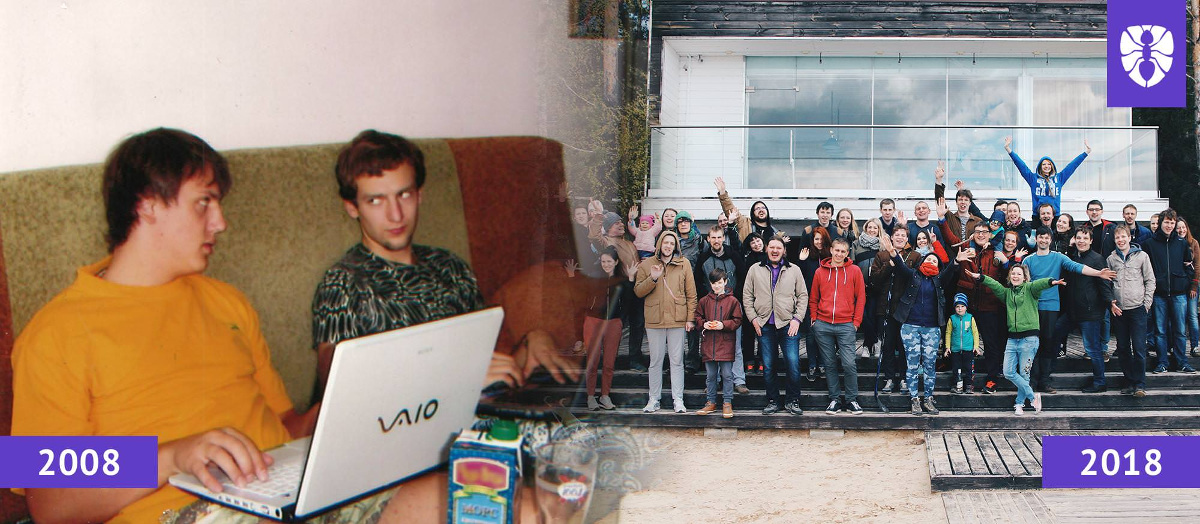
The beginning of the company "Flant" is closely intertwined with the Moscow Technical University - MIEM (now MIEM HSE ). To be more precise - mainly with one of its departments: EVA (electronic computing equipment) in the early years or ICT (information and communication technologies) in the future. By different coincidence of circumstances, the future founders of the company arrived at it: Dmitry Stolyarov ( distol ) and Dmitry Shurupov ( shurup ) - and, as they say, did not lose. Because a very democratic and youthful atmosphere was cultivated there - thanks for this to the management of the department (its head prof., Dr. VN Azarov, and his future deputy Denis Korolev).
')

The site of the ICT department in 2008
This situation consisted in the fact that sincerely keen on IT students were actively assisted in their development in interesting areas, and most importantly - the application of their knowledge in practice. This circumstance quickly multiplied on the love of GNU / Linux and Open Source from one of Dmitriev (by that time he had led nixp.ru , which was now frozen in time) for several years , great enthusiasm and a systematic approach to everything else interests / needs of the department in the development of internal electronic resources ...
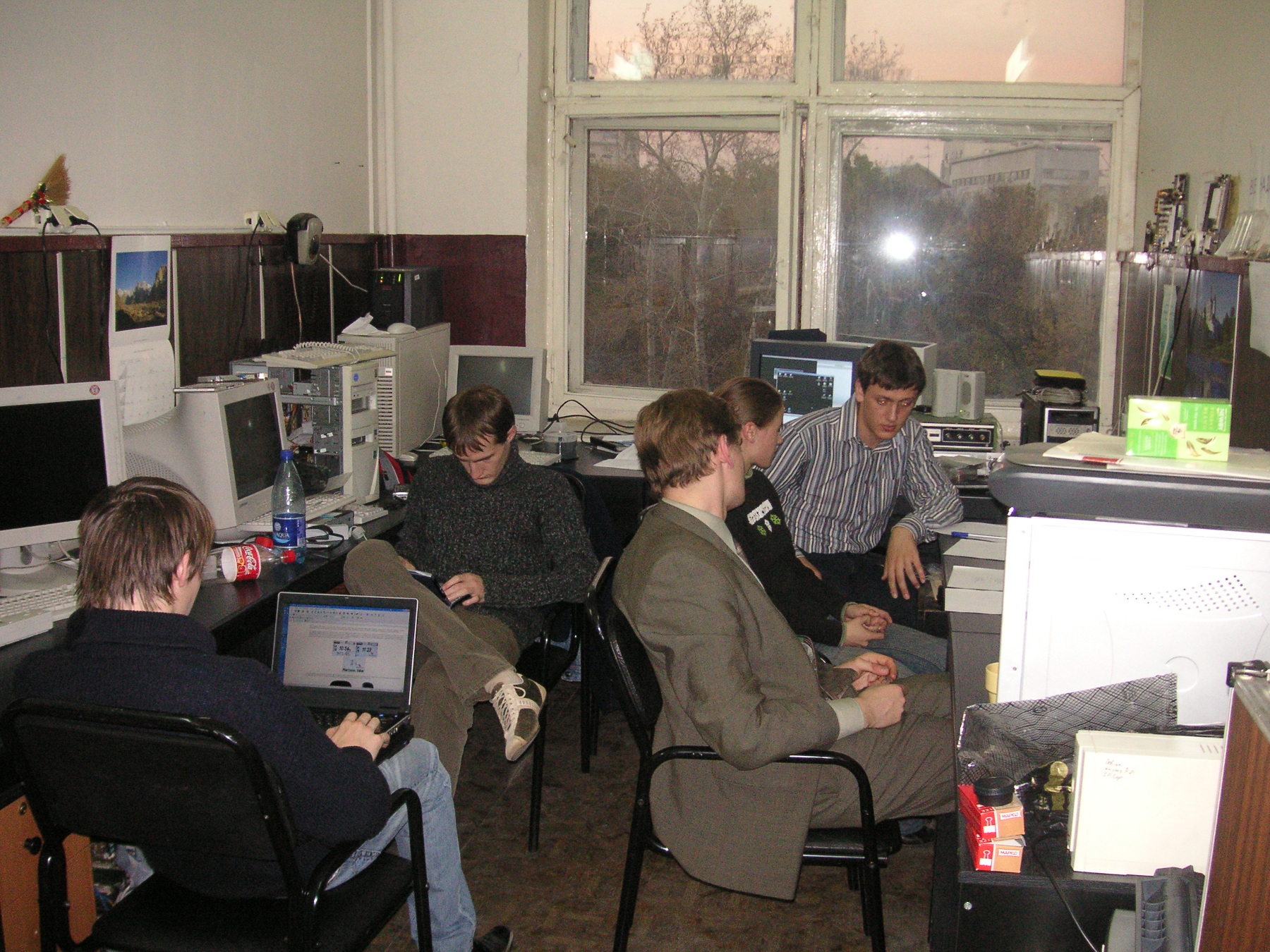
2005 year. The atmosphere of the first server department, which was both a laboratory and a place for self-education
The result is a quick infusion into a friendly team for joint participation over the countless initiatives of the department and soon the leadership of many of them. As part of what was called the “ unified information environment of the department, ” services such as a single user directory (based on LDAP) , file storage (with access using different protocols and delineation of rights) , e-mail, numerous Web applications that included both ready-made Open Source products, customized for the needs of education, and their own developments based on their own engine (the screenshot of the department’s website above is an example of such a case) , etc.
All these services were built on Open Source products and installed on servers running GNU / Linux. And all the activity, of course, had a multiple effect: there was an improvement in the learning process, and the involvement of undergraduate / graduate students in real projects (in particular, many of them became term papers and dissertations), and the formation of an active community (not only in the network, since offline-events were regularly organized as well as increasing the attractiveness of the department (with hopes of transferring ideas to the scale of the university).
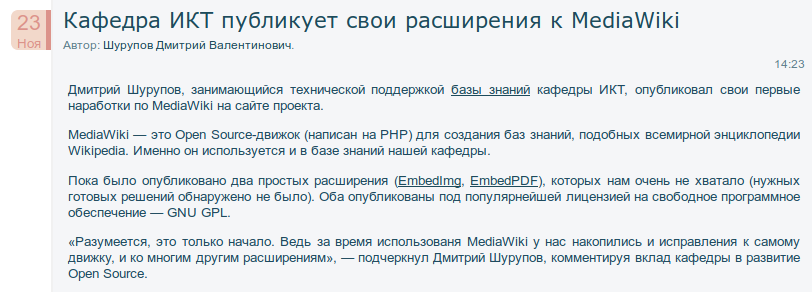
2008 Feedback to the world of open source from the department

year 2009. Online discussion of the department’s electronic resources
At the same time (~ 2004–2007), we have developed an understanding that the services created and supported based on Open Source solutions are in demand not only in the educational environment, but also in the market . The transition from this understanding to a new business has begun.
Globally, we focused on two broad areas in which, as we thought, the most experience was accumulated: corporate IT infrastructure for offices of small companies and web applications (not development, but installation / configuration / integration). And somewhere between them was the exploitation of everything that works in Linux. In practice, there was a lot of development (mainly for the web, although there were also system tasks) ... however, development as such did not attract us sufficiently (some connecting components from the field of system integration were an exception).
The company decided to call TrueOffice , which, as we discovered later, was funny in Russian for people “from the outside” (yes, they seriously thought that we had a cleaning company - after all, TruOffice!) . Registration of a legal entity was recorded on May 13, 2008 , and we consider this day to be the official birthday of the company.

The first company logo that beats the idea of openness with a door instead of a window
We did not leave active work in the department: both for ideological reasons (to do better for it what is in our power, for the benefit of others - especially new students), and from practical (many opportunities for various experiments). But they were no longer limited to high school ...
One of the first "third-party" projects was the panel to manage hosting (and simple billing). It was a Perl development consisting of a web interface and a daemon that started through xinetd and directly managed the configurations of the necessary services (web server, DBMS, DNS, mail). The architecture provided for the possibility of distributed start of services on an arbitrary number of servers, and the daemon installed on each of them communicated with the client (web interface) using its own encrypted protocol.
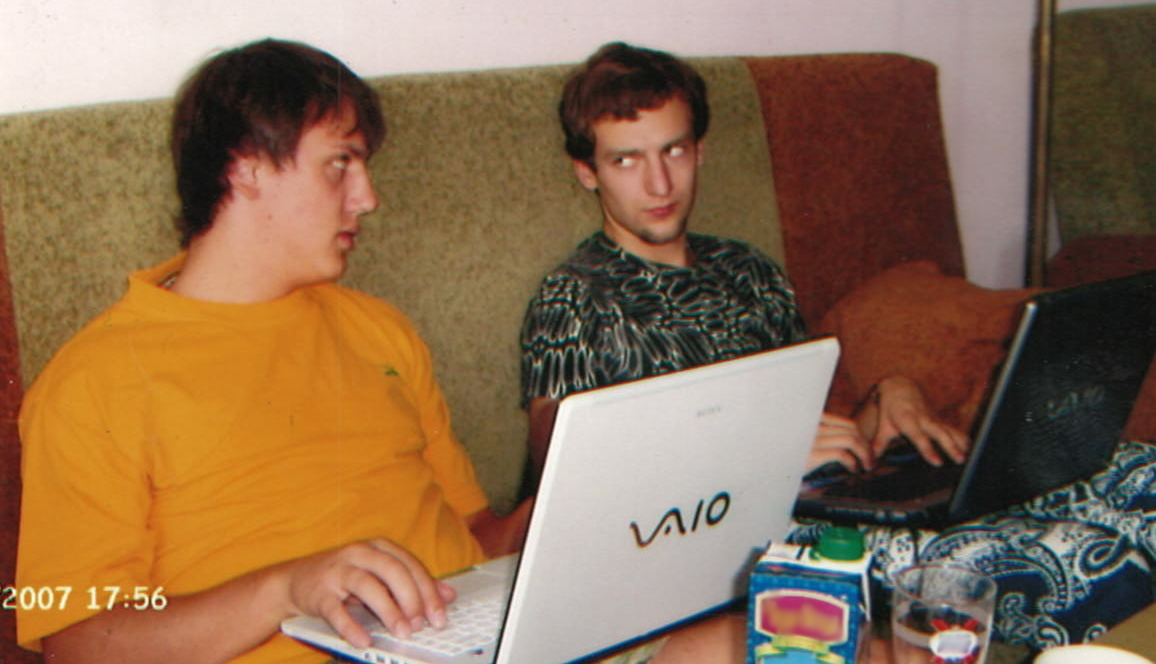
2007 Dmitry Stolyarov and Dmitry Shurupov are working on a panel for hosting in the apartment of one of them
The reason for creating this system, which received the internal name TOHCP (TrueOffice Hosting Control Panel), became the needs of our friend, who ran a small web studio. Subsequently, it will become our first client, and the TOHCP installation, initially deployed on the infrastructure of virtual servers (someone else remembers Linux-VServer?) On hosts with Gentoo Linux, has worked in production for many years.

List of TOHCP protocol commands for Apache and BIND services (from the early panel presentation)
Among the other first clients in the early years were some organizations located in the building of the same MIEM, several other web studios and web projects. Serving them, we devoted a lot of time to the future - R & D in the field of creating standard universal solutions (that is, ready for the rapid deployment of corporate infrastructure in the spirit of that “single environment of the department”) , as well as automation of package assembly and all sisadmin’s routines for a growing number of servers where we used Gentoo Linux everywhere ...
Here I recall the comment left by me once in the mail of a well-known Russian free software enthusiast (Vitaly Lipatov, who founded Etersoft in 2003) at the dawn of our company. I can’t find it in the original, but the essence was that “you invented a good deal, of course, but with the choice of a source-based distribution, they got excited.” By 2010, when the number of fascinating cares for the care of his beloved Gentoo exceeded reasonable limits, we made a difficult decision to move to an opposition camp - to Ubuntu . In a significant sense, this legendary bike from bash turned out to be a harsh reality for us:
By the beginning of the same year 2010, we were in full swing implementing a fairly large development project, which we decided to undertake ... because it was not easy and it was really interesting to do it. And yes, it turned out, but I mentioned it for the sake of another - a funny story involving the well-known Open Source-enthusiast (Micah Cohen), who at that time left the post of wget maintender and was looking for a replacement. We asked him to send a joking email to the architect of our development, since some of its functions were overlapped by the capabilities of wget, and he did this by supplying the letter with his “reflections” on the topic C vs. C ++, which thoroughly amused us all.
In 2011, it became clear that we are doing too much of what we do not actually sell (a typical mistake of many technical enthusiasts who enter the business) and decided to rethink their activities somewhat, and at the same time to rebrand (yes, fashionable at the time) .
The latter consisted in changing the name to "Flant" and updating the logo, corporate identity, website. The official interpretation of the new name was as follows:

"Formic" advertising "Flanta" in the magazine "System Administrator" (2013)
Much later, dear Alexander Ziza from Aletheia Business will not once explain to us how deeply wrong it is to place insects on the company's logo ... But with all due respect, something protests inside, so we discarded thesuperstitions with expert recommendations and left it at that.
Reconsideration has materialized in such a way that we have shifted to the provision of services - instead of creating some universal solutions. In fact, it was about any Linux tasks that customers need, whether it be comprehensive support of the corporate infrastructure, implementation of a single service, development of a specific module for the Linux kernel, or advice on choosing a compatible Linux hardware. This corresponded more to the realities of the market that we saw during our first years of work.
2011 ended a very promising event for us - the signing of an agreement with one of the largest taxis in Moscow (City-Mobile). Their leader called our attendant on the day off, asking if we could work with FreeBSD. As he himself explained later, he found our site in Yandex, the texts on technical issues seemed convincing, and also: “I’ve looked here that you are doing some IT magazines *, and decided that you can be trusted.” Result: we have worked together for more than 7 years, implementing and maintaining the entire business-critical infrastructure, including weighted web servers and DBMS, IP telephony, and even workplaces in call centers.
* The fact is that Dmitry Sh. Was the creator and editor-in-chief of the Open Source e-application for the print journal System Administrator (2005–2013).
At about the same time, two new technical managers officially joined the company: Andrei Kolashtov ( jambo ) and Andrei Polovov ( driusha ), with whom we, by the way, had worked one way or another for several years. Such an addition to the founders of the company has defined our extended leadership for years to come.
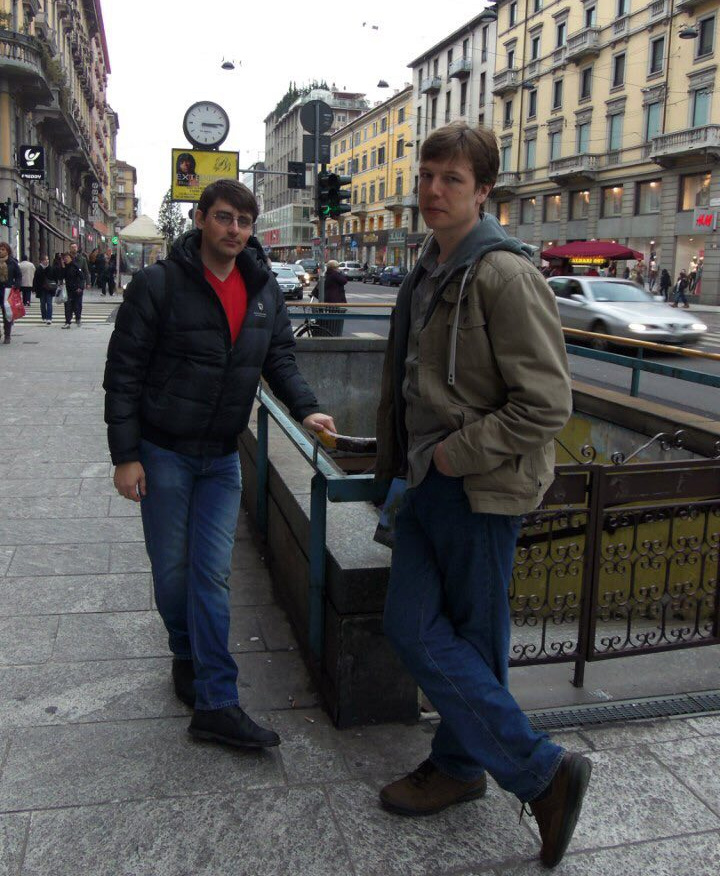
Andrey Kolashtov and Andrey Polovov at the beginning of 2013
Both come from the same department, which, by the way, retained the role of the “ forge of cadres ” and for a long time after we all left our activities at the university. Even today, about a quarter of our entire team are graduates of one department.
The next 2012 year was remembered for obtaining the status of the first agent of the partner network Canonical in Russia. Turning to Ubuntu and catching the corresponding mass trend, we thought that official support for it would be in demand ... Having joined forces with the leaders of two other companies, we began to promote this idea to even greater masses. To this end , several offline events were organized in Moscow ( Software Freedom Day , Ubuntu 12.04 InstallFest ), and various video clips were made - for example:
The growth of the company was expressed in the first certification of engineers (for LPIC), as well as in moving to a new office in Moscow (more spacious).

Moscow office of the company "Flant" in 2012
In 2013, we went further and launched our first (and last for today) branch - an office in Nizhny Novgorod . First, choose a city. They wanted a million people (to have a greater choice of personnel), with the IT topic popular among the public and local companies, closer to Moscow (so that experienced Moscow employees would be comfortable and not very expensive to get acquainted with all of them and train them). An additional criterion - it is desirable to lodge someone in this city for the convenience of solving all sorts of questions on the spot; still the first such experience! This someone I became.
Having gone to Nizhny Novgorod for the first time in my life, literally in one day, the two of us together with Dmitry S. looked at several office options, several apartment options, and interviewed several children. The buildings were chosen, people were found - in less than a month the Flanta Nizhny Novgorod office began work.
Such a quick selection of people, however, soon taught us that everything must be done differently. Until now, we generally tried to close our staffing requirements with familiar people from the department as much as possible, only occasionally supplementing them with candidates from the outside. However, in the case of NN, all the staff were unfamiliar to us, and their number grew ... So suddenly it turned out that even the candidates who were persuasive at the interviews, i.e. confidently telling about technologies that are relevant to us, do not necessarily have a good experience even in simple things.
Therefore, we have created a practical test task , which seems to be an exciting quest to rescue a broken host and perform some operations on it. To this day, it is used in the selection of all engineers, and since you are reading this article, you may even have passed it. Over the years, the task has undergone various changes (and received a lot of editors for different vacancies), but its essence remained unchanged: to test in practice the basic skills of working with Linux (and not only). During its execution, we are, in fact, looking at other (no less important than technical) factors, but perhaps I will not reveal them all in this article. The main thing is that this innovation has qualitatively improved the selection of people, thanks to which we no longer repeated the mistakes of the past (however, we did new ones).

Typical problem at the very beginning of the test
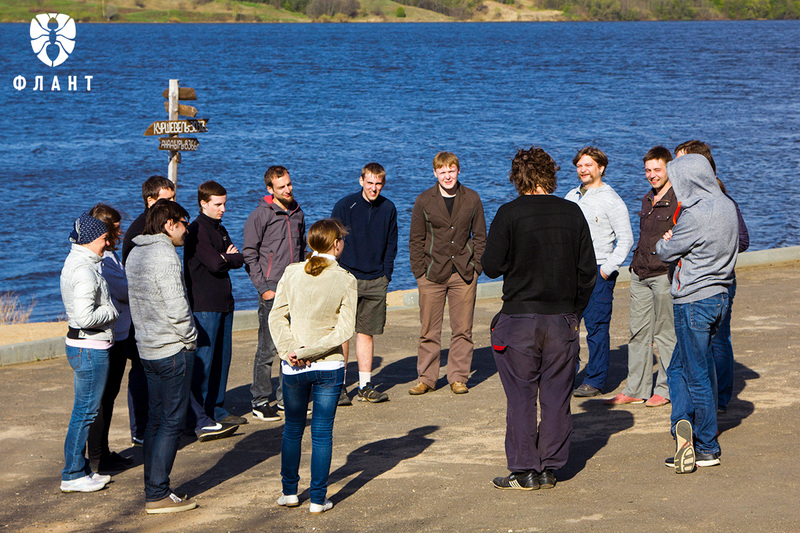
year 2014. The first major corporate event "Flanta" was held in the town of Plyos on the occasion of the 6th anniversary of the company.
In parallel with this, we again rethink our activities and come to the conclusion that we are trying to encompass the immense. Being engaged in "everything under Linux", we managed, for example, to develop, implement and maintain:
Looking back, it can be said that often tasks that are interesting to us as technicians eat up a lot of resources, bring little money and / or leave little or no value for future use. However, at the same time - some of these projects were able to help us stay afloat in difficult times and provide the necessary investments for the development of targeted areas. Therefore, the global answer to this question is not so simple and requires taking into account many factors in each specific situation, making up the art of managing a company ...
Anyway, at this point (2013), we single out several specific specializations and promise ourselves not to take on services that are not directly related to them. First, there are 6 of them, and they include (in addition to loaded web services) complex networks, telephony and even Linux desktops; in two years they become 4, in another year - 3 ... Today there are 2, but they are divided a little differently - more by the type of service than by the technologies themselves, which are on the same plane.

Specializations "Flanta" by 2016
During these years (2013–2015) we have managed to collect well-known clients including Forbes, leprosorium.ru and dirty.ru, Channel One ... however, attempts to make sales predictable and stable - first with an active sales manager, then with a director in this area. - do not become systemic and do not bring the desired result.
Few people know that in early 2013, having web developers on our staff and spitting on all plans to reduce activities, we even made a ridiculous attempt to “enter the Western market” (sorry for the loud marketing turnaround) - to sell the creation of simple websites . But such fun did not lead to anything ... except for inventing funny names for tariffs.

The year 2015 became a turning point in its own way: Dmitriy S. declares that all this time we were mainly engaged in one - web applications . Then why spray on everything else, even if this market is more than enough for us? Especially since this is exactly what we really love to do, what we understand and have accumulated vast experience?
By keeping all clients with other tasks as legacy (must be supported, but without prospects for development) , we essentially switch to the only direction. At the same time, Kubernetes flashes on the horizon, as if personifying “the fact that Dmitry S. waited his whole life,” and the course of this single direction was predetermined.
Finally, we begin to participate in the conferences of Oleg Bunin, where we are first convinced of the correctness of the new picture of the world, and soon (already in 2016) we are even more actively involved in the community with the first reports , showing our experience, the interest in which is confirmed by the remarkable feedback.

"Flant" on HighLoad ++ 2016
The “internal” work in the company is in full swing : in 2016, we will start developing our own dapp utility. This is not our first open source project, but it is noticeably larger than all its predecessors. The reason for this is simple: dapp is not just some kind of utility whose code is nice to open to the community. This is a central tool that our engineers use every day in their work. It allows you to truly conveniently and efficiently solve the problems that have become key when serving our “new design” clients.
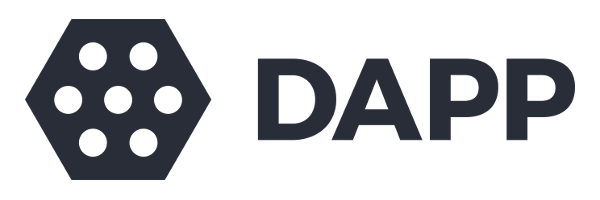
Another facet of the internal work - after the next long search for a person who organizes stable sales to us, we attract the next department friend, Alexander Batalov ( BANTIK ), to the company . And now, after two years, we can say that here we have moved from the dead center.
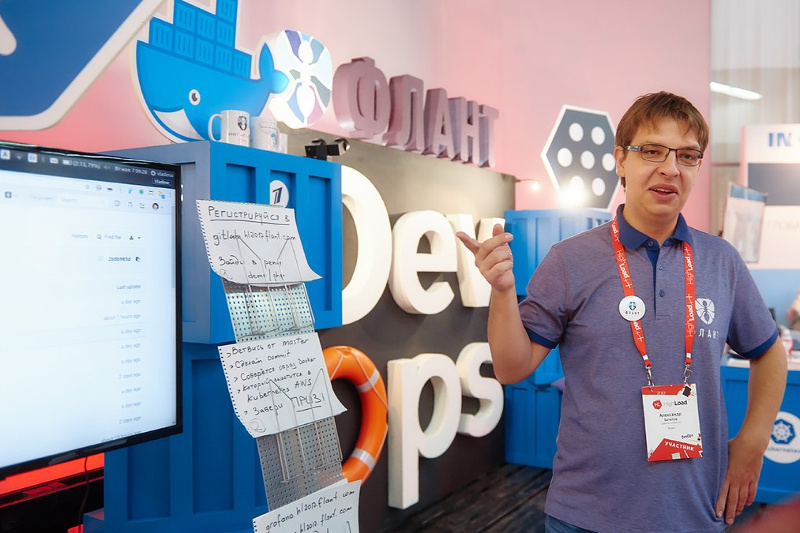
Alexander Batalov at the Flant company booth at HighLoad ++ 2017
To help him and this area as a whole, at the beginning of 2017, we - again, finally! - we do what we discussed in the manual for several years without concrete actions: we launch a blog on Habré. The relevance of those who are close to us in our daily work allows us to quickly gather interested audiences.
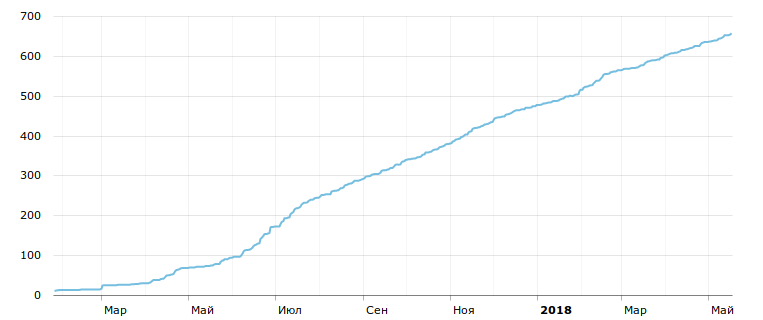
Growth of blog subscribers "Flanta" in Habré
All this together had a general effect, which led to the rapid growth and celebration of the 9th anniversary with the greatest composition for our history:

Sense of humor is valuable in any team, and we are no exception. And today it mainly materializes in Slack, from which the following plots are mainly borrowed.
By the way, more than one year the corporate Slack has welcomed all of us with such a joke:
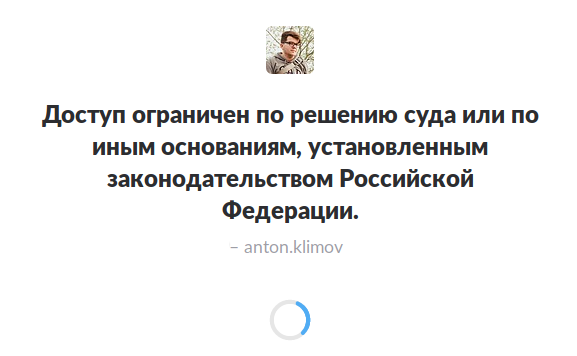
... however, the reaction to it, in view of recent events in the Russian digital space, has ceased to be limited to just a smile.
So, based on the phone call of our technician, the most creative enthusiast from the development team made such a wonderful Coub:
And the same Andryukha, to whom the author refers, in his free time he enjoys himself like this:
Another story relates to how last year we made another attempt to find a specialist who can sell our complex services well. And we did it too! Judge for yourself:

Not without humor and customers. When we introduced the position of “director of service” and he introduced himself to everyone, something like the following dialogue happened:
In Slack, we have a special bot with the name of the company, the appeal to which with some task is an urgent call of the duty officer to solve it:
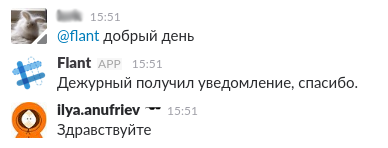
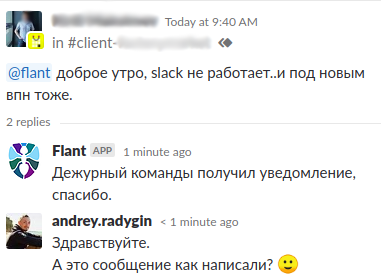
And in general, as you know, everyday communication with customers can be an endless well of good mood:



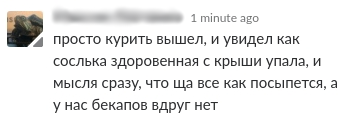
And some - just love to talk:
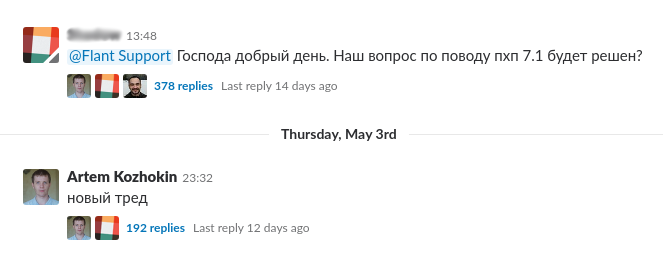
And we have many engineers love cats. Therefore, if someone decides to show it at a videoconference, you will not be surprised that there will be someone who surpasses it:
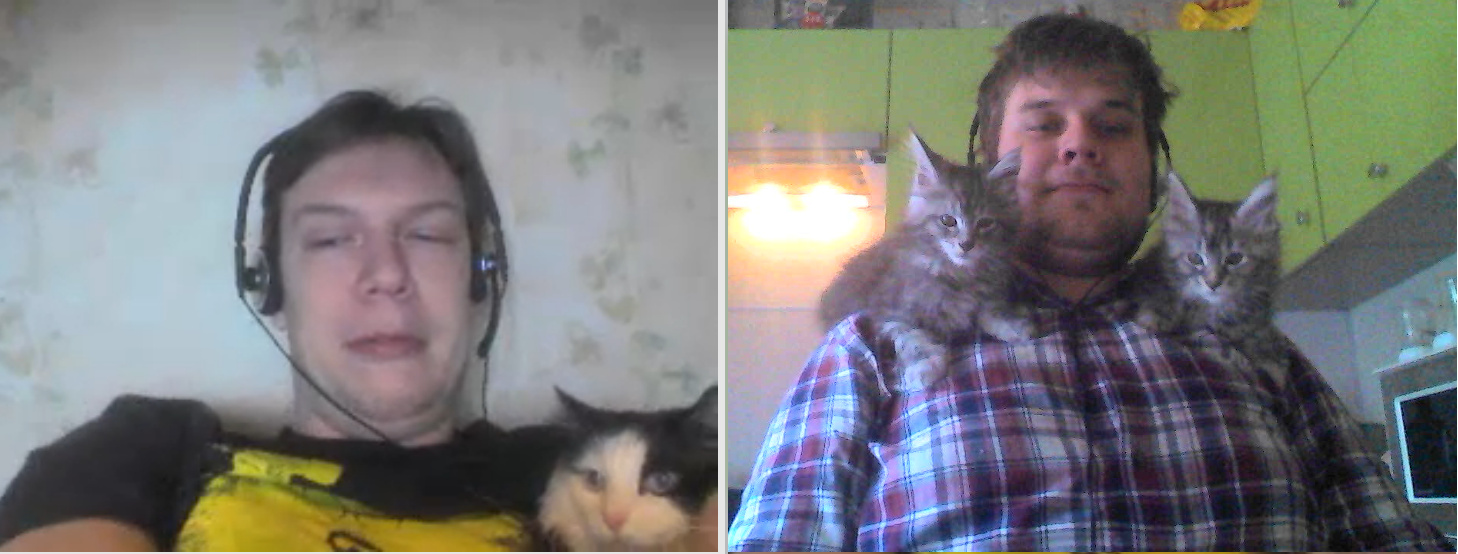
Today, there are already more than 50 of us, we are strongly distributed (from southern Europe to distant Asia), still purposeful and set up for equally interesting challenges.
How did we manage to create a company and come with it to this result in 10 years? Enthusiasm, diligence, the desire to be better, regular analysis of what is happening and a healthy sense of humor. What and you want!
And remember: yes, in business it is not always necessary to do only what you love and for what everything was up to, but it is very important to find and keep the balance that allows you to achieve the desired result, even if running to the sides, but keeping this is the movement itself and its direction.

Origins: MIEM
The beginning of the company "Flant" is closely intertwined with the Moscow Technical University - MIEM (now MIEM HSE ). To be more precise - mainly with one of its departments: EVA (electronic computing equipment) in the early years or ICT (information and communication technologies) in the future. By different coincidence of circumstances, the future founders of the company arrived at it: Dmitry Stolyarov ( distol ) and Dmitry Shurupov ( shurup ) - and, as they say, did not lose. Because a very democratic and youthful atmosphere was cultivated there - thanks for this to the management of the department (its head prof., Dr. VN Azarov, and his future deputy Denis Korolev).
')

The site of the ICT department in 2008
This situation consisted in the fact that sincerely keen on IT students were actively assisted in their development in interesting areas, and most importantly - the application of their knowledge in practice. This circumstance quickly multiplied on the love of GNU / Linux and Open Source from one of Dmitriev (by that time he had led nixp.ru , which was now frozen in time) for several years , great enthusiasm and a systematic approach to everything else interests / needs of the department in the development of internal electronic resources ...

2005 year. The atmosphere of the first server department, which was both a laboratory and a place for self-education
The result is a quick infusion into a friendly team for joint participation over the countless initiatives of the department and soon the leadership of many of them. As part of what was called the “ unified information environment of the department, ” services such as a single user directory (based on LDAP) , file storage (with access using different protocols and delineation of rights) , e-mail, numerous Web applications that included both ready-made Open Source products, customized for the needs of education, and their own developments based on their own engine (the screenshot of the department’s website above is an example of such a case) , etc.
All these services were built on Open Source products and installed on servers running GNU / Linux. And all the activity, of course, had a multiple effect: there was an improvement in the learning process, and the involvement of undergraduate / graduate students in real projects (in particular, many of them became term papers and dissertations), and the formation of an active community (not only in the network, since offline-events were regularly organized as well as increasing the attractiveness of the department (with hopes of transferring ideas to the scale of the university).

2008 Feedback to the world of open source from the department

year 2009. Online discussion of the department’s electronic resources
At the same time (~ 2004–2007), we have developed an understanding that the services created and supported based on Open Source solutions are in demand not only in the educational environment, but also in the market . The transition from this understanding to a new business has begun.
TruOffice
Globally, we focused on two broad areas in which, as we thought, the most experience was accumulated: corporate IT infrastructure for offices of small companies and web applications (not development, but installation / configuration / integration). And somewhere between them was the exploitation of everything that works in Linux. In practice, there was a lot of development (mainly for the web, although there were also system tasks) ... however, development as such did not attract us sufficiently (some connecting components from the field of system integration were an exception).
The company decided to call TrueOffice , which, as we discovered later, was funny in Russian for people “from the outside” (yes, they seriously thought that we had a cleaning company - after all, TruOffice!) . Registration of a legal entity was recorded on May 13, 2008 , and we consider this day to be the official birthday of the company.

The first company logo that beats the idea of openness with a door instead of a window
We did not leave active work in the department: both for ideological reasons (to do better for it what is in our power, for the benefit of others - especially new students), and from practical (many opportunities for various experiments). But they were no longer limited to high school ...
One of the first "third-party" projects was the panel to manage hosting (and simple billing). It was a Perl development consisting of a web interface and a daemon that started through xinetd and directly managed the configurations of the necessary services (web server, DBMS, DNS, mail). The architecture provided for the possibility of distributed start of services on an arbitrary number of servers, and the daemon installed on each of them communicated with the client (web interface) using its own encrypted protocol.

2007 Dmitry Stolyarov and Dmitry Shurupov are working on a panel for hosting in the apartment of one of them
The reason for creating this system, which received the internal name TOHCP (TrueOffice Hosting Control Panel), became the needs of our friend, who ran a small web studio. Subsequently, it will become our first client, and the TOHCP installation, initially deployed on the infrastructure of virtual servers (someone else remembers Linux-VServer?) On hosts with Gentoo Linux, has worked in production for many years.

List of TOHCP protocol commands for Apache and BIND services (from the early panel presentation)
Among the other first clients in the early years were some organizations located in the building of the same MIEM, several other web studios and web projects. Serving them, we devoted a lot of time to the future - R & D in the field of creating standard universal solutions (that is, ready for the rapid deployment of corporate infrastructure in the spirit of that “single environment of the department”) , as well as automation of package assembly and all sisadmin’s routines for a growing number of servers where we used Gentoo Linux everywhere ...
Here I recall the comment left by me once in the mail of a well-known Russian free software enthusiast (Vitaly Lipatov, who founded Etersoft in 2003) at the dawn of our company. I can’t find it in the original, but the essence was that “you invented a good deal, of course, but with the choice of a source-based distribution, they got excited.” By 2010, when the number of fascinating cares for the care of his beloved Gentoo exceeded reasonable limits, we made a difficult decision to move to an opposition camp - to Ubuntu . In a significant sense, this legendary bike from bash turned out to be a harsh reality for us:
Ubuntu's daughter ran to Debian and, laughing merrily, kissed his forehead: “Happy Birthday, Dad!”
Then she looked joyfully at the guests sitting at the table and asked in her sonorous voice:
- Dad, where is Gentoo, hasn't he come yet?
- No, he's still going.
By the beginning of the same year 2010, we were in full swing implementing a fairly large development project, which we decided to undertake ... because it was not easy and it was really interesting to do it. And yes, it turned out, but I mentioned it for the sake of another - a funny story involving the well-known Open Source-enthusiast (Micah Cohen), who at that time left the post of wget maintender and was looking for a replacement. We asked him to send a joking email to the architect of our development, since some of its functions were overlapped by the capabilities of wget, and he did this by supplying the letter with his “reflections” on the topic C vs. C ++, which thoroughly amused us all.
“TruOffice” → “Fant”
In 2011, it became clear that we are doing too much of what we do not actually sell (a typical mistake of many technical enthusiasts who enter the business) and decided to rethink their activities somewhat, and at the same time to rebrand (yes, fashionable at the time) .
The latter consisted in changing the name to "Flant" and updating the logo, corporate identity, website. The official interpretation of the new name was as follows:
The word "Flant" has an English-language basis - "flant" - which stands for f ree / l ibre ant ("free ant"), and also has the slang value fl ying ant ("flying ant").

"Formic" advertising "Flanta" in the magazine "System Administrator" (2013)
Much later, dear Alexander Ziza from Aletheia Business will not once explain to us how deeply wrong it is to place insects on the company's logo ... But with all due respect, something protests inside, so we discarded the
Reconsideration has materialized in such a way that we have shifted to the provision of services - instead of creating some universal solutions. In fact, it was about any Linux tasks that customers need, whether it be comprehensive support of the corporate infrastructure, implementation of a single service, development of a specific module for the Linux kernel, or advice on choosing a compatible Linux hardware. This corresponded more to the realities of the market that we saw during our first years of work.
2011 ended a very promising event for us - the signing of an agreement with one of the largest taxis in Moscow (City-Mobile). Their leader called our attendant on the day off, asking if we could work with FreeBSD. As he himself explained later, he found our site in Yandex, the texts on technical issues seemed convincing, and also: “I’ve looked here that you are doing some IT magazines *, and decided that you can be trusted.” Result: we have worked together for more than 7 years, implementing and maintaining the entire business-critical infrastructure, including weighted web servers and DBMS, IP telephony, and even workplaces in call centers.
* The fact is that Dmitry Sh. Was the creator and editor-in-chief of the Open Source e-application for the print journal System Administrator (2005–2013).
At about the same time, two new technical managers officially joined the company: Andrei Kolashtov ( jambo ) and Andrei Polovov ( driusha ), with whom we, by the way, had worked one way or another for several years. Such an addition to the founders of the company has defined our extended leadership for years to come.

Andrey Kolashtov and Andrey Polovov at the beginning of 2013
Both come from the same department, which, by the way, retained the role of the “ forge of cadres ” and for a long time after we all left our activities at the university. Even today, about a quarter of our entire team are graduates of one department.
Ubuntu and new offices
The next 2012 year was remembered for obtaining the status of the first agent of the partner network Canonical in Russia. Turning to Ubuntu and catching the corresponding mass trend, we thought that official support for it would be in demand ... Having joined forces with the leaders of two other companies, we began to promote this idea to even greater masses. To this end , several offline events were organized in Moscow ( Software Freedom Day , Ubuntu 12.04 InstallFest ), and various video clips were made - for example:
The growth of the company was expressed in the first certification of engineers (for LPIC), as well as in moving to a new office in Moscow (more spacious).

Moscow office of the company "Flant" in 2012
In 2013, we went further and launched our first (and last for today) branch - an office in Nizhny Novgorod . First, choose a city. They wanted a million people (to have a greater choice of personnel), with the IT topic popular among the public and local companies, closer to Moscow (so that experienced Moscow employees would be comfortable and not very expensive to get acquainted with all of them and train them). An additional criterion - it is desirable to lodge someone in this city for the convenience of solving all sorts of questions on the spot; still the first such experience! This someone I became.
Having gone to Nizhny Novgorod for the first time in my life, literally in one day, the two of us together with Dmitry S. looked at several office options, several apartment options, and interviewed several children. The buildings were chosen, people were found - in less than a month the Flanta Nizhny Novgorod office began work.
Growing up
Such a quick selection of people, however, soon taught us that everything must be done differently. Until now, we generally tried to close our staffing requirements with familiar people from the department as much as possible, only occasionally supplementing them with candidates from the outside. However, in the case of NN, all the staff were unfamiliar to us, and their number grew ... So suddenly it turned out that even the candidates who were persuasive at the interviews, i.e. confidently telling about technologies that are relevant to us, do not necessarily have a good experience even in simple things.
Therefore, we have created a practical test task , which seems to be an exciting quest to rescue a broken host and perform some operations on it. To this day, it is used in the selection of all engineers, and since you are reading this article, you may even have passed it. Over the years, the task has undergone various changes (and received a lot of editors for different vacancies), but its essence remained unchanged: to test in practice the basic skills of working with Linux (and not only). During its execution, we are, in fact, looking at other (no less important than technical) factors, but perhaps I will not reveal them all in this article. The main thing is that this innovation has qualitatively improved the selection of people, thanks to which we no longer repeated the mistakes of the past (however, we did new ones).

Typical problem at the very beginning of the test

year 2014. The first major corporate event "Flanta" was held in the town of Plyos on the occasion of the 6th anniversary of the company.
In parallel with this, we again rethink our activities and come to the conclusion that we are trying to encompass the immense. Being engaged in "everything under Linux", we managed, for example, to develop, implement and maintain:
- a comprehensive system for ensuring flexible management (via a web interface) of access for employees of a distributed (multi-branch) enterprise to the network;
- a system for receiving taxi orders with a huge range of capabilities and integration with telephony and a number of other applications;
- a system for a Linux terminal at the cash desks of a well-known Russian retail chain;
- Linux-firmware with entertainment system for tablets in a taxi, updated over the network;
- online store for a large supermarket chain;
- CRM system installation integrated with a ticket-writing system;
- and many many others…
Looking back, it can be said that often tasks that are interesting to us as technicians eat up a lot of resources, bring little money and / or leave little or no value for future use. However, at the same time - some of these projects were able to help us stay afloat in difficult times and provide the necessary investments for the development of targeted areas. Therefore, the global answer to this question is not so simple and requires taking into account many factors in each specific situation, making up the art of managing a company ...
Anyway, at this point (2013), we single out several specific specializations and promise ourselves not to take on services that are not directly related to them. First, there are 6 of them, and they include (in addition to loaded web services) complex networks, telephony and even Linux desktops; in two years they become 4, in another year - 3 ... Today there are 2, but they are divided a little differently - more by the type of service than by the technologies themselves, which are on the same plane.

Specializations "Flanta" by 2016
During these years (2013–2015) we have managed to collect well-known clients including Forbes, leprosorium.ru and dirty.ru, Channel One ... however, attempts to make sales predictable and stable - first with an active sales manager, then with a director in this area. - do not become systemic and do not bring the desired result.
Few people know that in early 2013, having web developers on our staff and spitting on all plans to reduce activities, we even made a ridiculous attempt to “enter the Western market” (sorry for the loud marketing turnaround) - to sell the creation of simple websites . But such fun did not lead to anything ... except for inventing funny names for tariffs.

Modernity
The year 2015 became a turning point in its own way: Dmitriy S. declares that all this time we were mainly engaged in one - web applications . Then why spray on everything else, even if this market is more than enough for us? Especially since this is exactly what we really love to do, what we understand and have accumulated vast experience?
By keeping all clients with other tasks as legacy (must be supported, but without prospects for development) , we essentially switch to the only direction. At the same time, Kubernetes flashes on the horizon, as if personifying “the fact that Dmitry S. waited his whole life,” and the course of this single direction was predetermined.
Finally, we begin to participate in the conferences of Oleg Bunin, where we are first convinced of the correctness of the new picture of the world, and soon (already in 2016) we are even more actively involved in the community with the first reports , showing our experience, the interest in which is confirmed by the remarkable feedback.

"Flant" on HighLoad ++ 2016
The “internal” work in the company is in full swing : in 2016, we will start developing our own dapp utility. This is not our first open source project, but it is noticeably larger than all its predecessors. The reason for this is simple: dapp is not just some kind of utility whose code is nice to open to the community. This is a central tool that our engineers use every day in their work. It allows you to truly conveniently and efficiently solve the problems that have become key when serving our “new design” clients.

Another facet of the internal work - after the next long search for a person who organizes stable sales to us, we attract the next department friend, Alexander Batalov ( BANTIK ), to the company . And now, after two years, we can say that here we have moved from the dead center.

Alexander Batalov at the Flant company booth at HighLoad ++ 2017
To help him and this area as a whole, at the beginning of 2017, we - again, finally! - we do what we discussed in the manual for several years without concrete actions: we launch a blog on Habré. The relevance of those who are close to us in our daily work allows us to quickly gather interested audiences.

Growth of blog subscribers "Flanta" in Habré
All this together had a general effect, which led to the rapid growth and celebration of the 9th anniversary with the greatest composition for our history:

For those who read to the end
Sense of humor is valuable in any team, and we are no exception. And today it mainly materializes in Slack, from which the following plots are mainly borrowed.
By the way, more than one year the corporate Slack has welcomed all of us with such a joke:

... however, the reaction to it, in view of recent events in the Russian digital space, has ceased to be limited to just a smile.
So, based on the phone call of our technician, the most creative enthusiast from the development team made such a wonderful Coub:
And the same Andryukha, to whom the author refers, in his free time he enjoys himself like this:
Another story relates to how last year we made another attempt to find a specialist who can sell our complex services well. And we did it too! Judge for yourself:

Not without humor and customers. When we introduced the position of “director of service” and he introduced himself to everyone, something like the following dialogue happened:
- Hello! I, Vladimir, Director of Service, would like to arrange a meeting-acquaintance with you in order to learn about your problems and find ways to solve them.
- Oops! And who was he before?
- We did not have such a post before.
- Aaaa, so that's why the service was so bad ...
In Slack, we have a special bot with the name of the company, the appeal to which with some task is an urgent call of the duty officer to solve it:


And in general, as you know, everyday communication with customers can be an endless well of good mood:




And some - just love to talk:

And we have many engineers love cats. Therefore, if someone decides to show it at a videoconference, you will not be surprised that there will be someone who surpasses it:

Results
Today, there are already more than 50 of us, we are strongly distributed (from southern Europe to distant Asia), still purposeful and set up for equally interesting challenges.
How did we manage to create a company and come with it to this result in 10 years? Enthusiasm, diligence, the desire to be better, regular analysis of what is happening and a healthy sense of humor. What and you want!
And remember: yes, in business it is not always necessary to do only what you love and for what everything was up to, but it is very important to find and keep the balance that allows you to achieve the desired result, even if running to the sides, but keeping this is the movement itself and its direction.
Source: https://habr.com/ru/post/358418/
All Articles